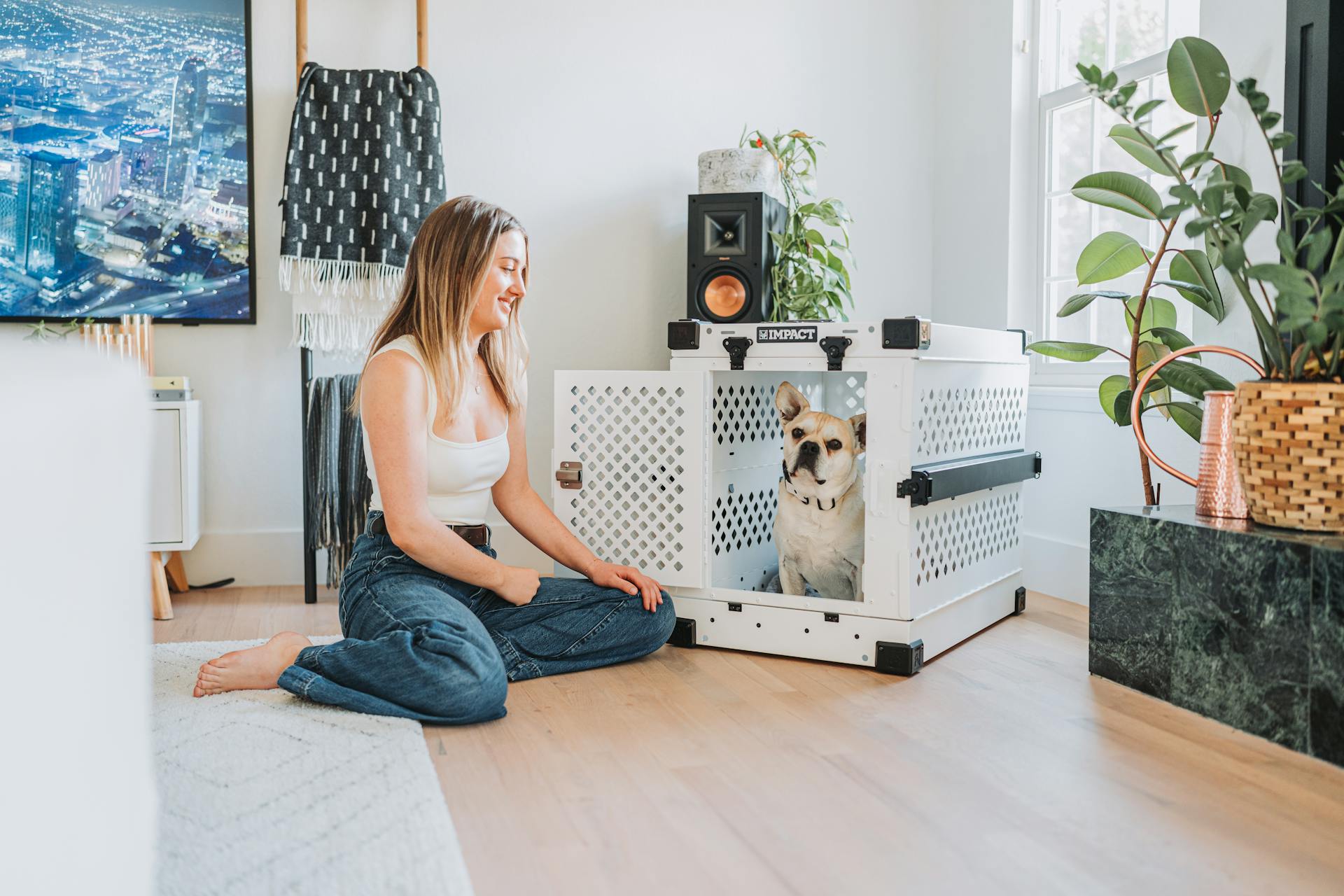
If your beloved pup is destroying his bed, it's probably leaving you confused and frustrated. After all, not only is this a problem that can lead to costly replacements, but it also leaves you wondering why your dog feels the need to do it in the first place.
One of the most common reasons why dogs destroy their beds is due to boredom or lack of stimulation. If your pet isn’t getting enough exercise or mental enrichment during their daily lives, they may try to express themselves through more destructive ways like chewing on their bedding.
Stress and anxiety can also be a reason for this behavior in some cases. Just like humans, when dogs are anxious they may act erratically or try to push away disruptions - which could mean tearing apart objects like beds in order to relieve them from feeling overwhelmed by certain situations.
It’s important to pay close attention and observe how your dog acts after certain events occur (like visitors coming over). Once you identify what might be causing this pattern of behavior, there are steps you can take toward prevention such as making sure they live in a calming environment with plenty of stimulating opportunities (such as chew toys) and long periods of exercise each day that helps expel energy so they won’t feel drawn toward scratching/chewing on furniture anymore.
Additional reading: When Dogs Try to Play Leapfrog 18+?
Why does my dog chew up his toys?
Chewing is a natural behavior for dogs, especially puppies and younger dogs. When a dog chews his toys, he's engaging in an instinctive behavior that can provide mental stimulation as well as physical exercise. Chewing keeps your pup occupied and gives them something to do other than pull at their lead or bark all day.
However, the act of chewing up toys can also be linked to boredom, stress or anxiety in some cases. If your dog is alone during the day while you are away at work, they may be trying to find an outlet for pent-up energy and loneliness. Other signs of this type of behavior include chewing furniture or pawing at windows in search of attention from you when you return home from work.
Therefore, it’s important to understand both why your pup might chew their toys as well as what your options are for addressing the underlying cause(s). To avoid boredom-related chewing problems consider providing plenty of playtime opportunities with interactive treats such as stuffed Kongs filled with tasty snacks or puzzle activities designed specifically for Dogs (or cats!). You can also give them a “busy” toy that dispenses treats when they roll it around on the floor; this encourages self-playing which not only burns off extra energy but stimulates their mind too! Lastly if stress and anxiety are causing excessive toy frustration, talk to a professional about introducing strategies like routine obedience training classes or scents such diffusers which release calming aromas into their environment..
In summary: Determine why exactly does my pup chew up his toys? The answer could vary depending on age/breed/environmental factors alike but ultimately provide enough mental stimulation via interactive/treat releasing games & practice positive reinforcement training methods if needed!
For another approach, see: Make Dog Toys
Why is my dog constantly digging up his bed?
It can be both disconcerting and frustrating to come home to find that your dog has been digging up his bed. But before you panic, know that it isn’t necessarily a sign of bad behaviour – it could actually be a sign of contentment from your pup!
Funnily enough, the primary reason why dogs dig up their beds is because they’re so comfortable with them. When you think about their natural instinct to dig for protection and comfort in the wild, this makes perfect sense! By digging into their beds and making it even more comfortable against the ground, your pet is showing how much they appreciate having a safe place to call home.
Sometimes though this urge can come from stress or anxiety, particularly if your pup has been going through an adjustment period. It could be due to a recent relocation, change in environment or introduction of a new housemate. Your pup might not have the tools to effectively cope with such changes yet, so use calm words when creating routines and allowing them time alone if needed.
Digging can also simply be indicative of boredom – dogs will seek entertainment as much as people do! If this is true for yours in particular then providing more daily exercises (such as walks) and mental stimulation can help him work off any pent up energy he would rather put into his bed (and walls).
So before disciplining him for his pot-holing activities remember that there may just be an explanation behind this rather normal behaviour– now wouldn't it feel good if we all had ways to express our contentment like that?
Take a look at this: Pup Cup
What can I do to stop my dog from ripping apart his bed?
If your dog is actively ripping apart their bed, it's important to take action immediately in order to keep them safe. While destructive behavior can be tough to manage, there are a few steps you can take to help stop your pup from ripping up their bed.
1. Purchase an appropriate bed size - It's essential that your dog has a bed that's sized correctly for them. If the bed is too small or too big, they might feel uncomfortable and be more inclined to tear it apart. Check the tag of the product or measure your dog at home if you're unsure of what size may work best for them.
2. Replace shredded material - If the material is torn on their old bed, try replacing it with something softer or sturdier than before such as a fleece blanket or stronger fabric like canvas. This way they won't want to shred it as easily since there isn't anything for them pull out with their teeth and claws!
3. Switching things up - Try changing up where you place your pup's bed so they don't get bored or associate it with negative activity such as being yelled at when misbehaving. We want our pups feeling safely tucked away in their beds, which isn't possible if the space around it feels unpredictable!
4 Show proper chewing behavior - Provide chew toys that are specific for playtime rather than scold fetching and shredding activities so they understand exactly what chewing behaviors are acceptable and not acceptable within our homes. This is especially important because dogs often look to us —the leader —for cues on how we expect them behave!
Overall, if you find yourself dealing with destructive behavior from your pup here’s some tips: make sure their beds provide comfort, set clear boundaries on proper chewing environments within household, and rotate the placement of said bedroom area so there’s no negative association attaching themselves over time!
If this caught your attention, see: Why Does My Dog Want to Be Alone?
Why does my dog scratch at his bed incessantly?
It can be really concerning when we notice our four-legged friends continually scratching at their beds, especially if this behavior is new. There are a few potential causes that may explain why your dog is engaging in this behavior.
The first possibility is that your pooch may have something on or near the bed they are trying to remove. Whether it's an annoying intruding flea or a forgotten treat he's been craving, consider looking around the area for potential objects that could be upsetting him.
Another explanation for your pup's scratching could be associated with his comfort levels. Maybe his bedding isn’t supporting him adequately during rest; if you think this might be the case, try changing to a different bedding option that gives more support and cushioning — you can also evaluate whether where your dog rests is adequately warm and not in an area of drafts or excessively bright lighting.
Unfortunately vetsppetinsurance note stress behaviors can also manifest in our four-legged friends as excessive scratching, which could imply psychological issues such as separation anxiety — it would be advised to carefully observe your pooch before assuming any sort of treatment plan should symptoms persist over time and research further into such possibilities..
In conclusion when you start noticing occurrences of excessive scratching it’s important to take immediate action since there could potentially be many factors leading up to this behavior which we want to make sure resolve correctly before they become habituated behaviours more difficult to break!
If this caught your attention, see: Scratching Leather Furniture
How can I prevent my dog from shredding his bed?
Shredding a dog's bed is a common problem among pet owners, but the good news is that there are several things you can do to prevent it. First, invest in a durable and chew-resistant bed – new beds designed specifically for dogs with destructive tendencies are widely available today. Be sure to supervise your dog when he's inside and outside of the house, so that if he does start shredding his bed, you can intervene immediately. Another idea is to use positive reinforcement such as offering your pup treats or verbal praise when he behaves appropriately with his bed, which will serve as a reward for not shredding it. Additionally, make sure your pup has enough toys and chew items readily available so that his attention stays focused on those instead of his bed. Finally, exercise your dog daily – this will help him burn off extra energy and be less inclined to destroy things around the house. With these simple strategies in place, you should be able to prevent any further damage from happening!
You might enjoy: What Kind of Dog Is Cannoli on B Positive?
Could my dog's behavior indicate there is an underlying physical or emotional issue?
Animals, just like humans, can experience a wide array of physical and emotional issues throughout their life. Whether it’s the sudden onset of an injury or the build up of tension over time, signs and symptoms in our four legged friends should never be ignored. Our pets rely on us for many things; one being their health, not just physical but mental too. Behavior changes can be an indicator that something isn’t quite right with your pup – but how do you know when to seek professional advice?
Unusual behavior could point to both a physical or emotional issue. If they become withdrawn or aggressive this could signal emotional distress such as loneliness and depression, so it's important to pay close attention. Other possible signs of a larger underlying problem include unexplained accidents (indoor and outdoor), changes in appetite/water consumption, excessive panting or restlessness at night-time etc. All these could potentially indicate an underlying medical condition needing attention (such as arthritis).
It is also important to look for any changes in routine as this could also be a sign that your dog isn't feeling 100%. Has there been something new occurring lately? Perhaps another pet has joined the family recently which is upsetting them? Or maybe even more subtle factors like changes in surroundings creating stress etc? No matter how small, if unusual behaviors become significantly noticeable then getting them checked out by a vet would be best practice to rule out any physical causes first before considering an emotional aspect.
Sometimes it can be difficult figuring out exactly why your dog may have began behaving oddly but don’t fret – seeking qualified help from trained professionals should always be the primary source of advice if you are unsure! Understanding your pup's needs is vital so make sure you keep assessing their wellbeing so they don't suffer any further than need be; remember prevention is key!
Explore further: Dogs Don
Sources
- https://nashvillepaw.com/dog-scratch-bed
- https://nashvillepaw.com/dog-dig-bed
- https://iheartdogs.com/7-ways-to-tell-if-your-dog-is-emotionally-distressed/
- https://animalsmatter.com/blogs/news/why-do-dogs-tear-up-their-beds
- https://wowpooch.com/why-dogs-destroy-their-beds/
- https://dogsandclogs.com/why-do-dogs-scratch-their-beds/
- https://therapypet.org/blog/understanding-dog-emotions-and-behavior/
- https://pets.thenest.com/stop-dog-destroying-dog-bed-5692.html
- https://rehome.adoptapet.com/answers/dog-rehoming/how-do-i-stop-my-dog-from-shredding
- https://wagwalking.com/behavior/why-dogs-destroy-their-beds
- https://casper.com/blog/why-do-dogs-scratch-dig-in-their-bed/
- https://petstutorial.com/why-does-my-dog-destroy-his-bed/
Featured Images: pexels.com


